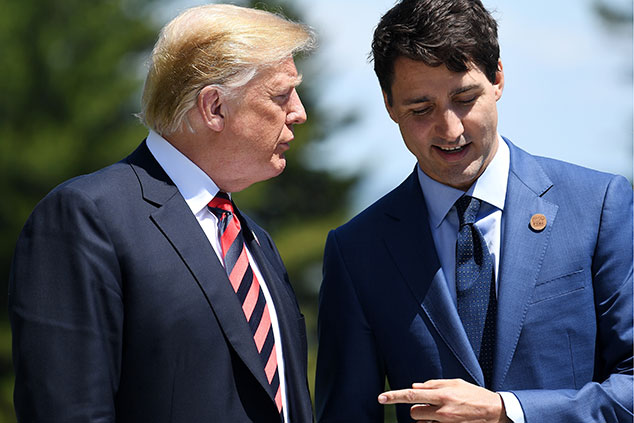
This article is taken from our FREE daily investment email Money Morning.
Every day, MoneyWeek’s executive editor John Stepek and guest contributors explain how current economic and political developments are affecting the markets and your wealth, and give you pointers on how you can profit.
.
In this week’s issue of MoneyWeek magazine
●
How to profit as the world gets fuller, richer and older
●
The top contrarian bets for your money today
●
Three small-cap stocks to shield you from the worst of the market’s ups and downs
●
Value investing vs momentum investing: watch out for the market’s mood swings
●
Energy fund experts have failed investors – look elsewhere
● Share tips of the week
Not a subscriber? Sign up here
“You calling me a liar, pal?”
It’s not the sort of language you’d expect to hear at a high-level conference of global political leaders.
But this weekend’s G7 meeting appears to have been an exception, with a rather more ill-tempered aftermath than we usually see from these things.
And it doesn’t bode well for global trade harmony.
Blame Canada! Trudeau and Trump square up
The leaders of the G7 countries – the US, the UK, Canada, Germany, France, Japan and Italy – had a shindig this weekend in Quebec.
The meeting took place just as US president Donald Trump has been stepping up his rhetoric – and his actions – on global trade. The US has decided to impose steel import tariffs on everyone, not just China. And it’s clear that many people in the administration think that this should just be a start.
If anyone was hoping that getting the world leaders together in a room was going to help out with any of this – well, they were disappointed.
Apparently, Trump was not on a charm offensive. He said that he wanted Russia to rejoin the G7. Maybe that’s not a bad idea, but given that relations between Russia and Europe (the UK in particular) are at a fairly obvious low point, it’s not the best way to start things off.
He was also complaining to all and sundry about the US acting to subsidise the rest of the world. “We’re like the piggy bank that everybody’s robbing.”
Anyway, they managed to hammer out a communiqué that contained a vague commitment to global trade – noting that they would all “strive to reduce tariff barriers, non-tariff barriers and subsidies” – which was apparently hugely diluted, in order to get the US to sign it.
Trump hopped on his plane. Canadian prime minister Justin Trudeau gave a press conference. He responded to a question on potential tariffs on vehicle imports, by noting that Canada wouldn’t be “pushed around”.
Trump got wind of it, and promptly pulled his signature from the communiqué, via Twitter. He also dismissed Trudeau as “very dishonest & weak”. And then, Peter Navarro, Trump’s trade adviser, told Fox News: “There’s a special place in hell for any foreign leader that engages in bad faith diplomacy with President Donald J Trump.”
(It’s quite the news clip – I recommend you watch it to get the full flavour.)
All in all, not a huge success.
Protectionism is contagious
So what’s this all about?
It’s pretty clear that Trump does not agree with the consensus that global trade is a good thing. The desire for more protectionist trade policy is not a one-off or a negotiating tool; it’s policy.
As Capital Economics notes, the various steel and aluminium tariffs already imposed are not huge in economic terms. The risk now, though, after this particularly fractious G7 meeting, is that trade war escalates, particularly between Canada and the US.
The investigation into vehicle imports will not be completed until February next year. But Trump could simply pull out of the North American Free Trade Agreement (Nafta), or escalate tensions with other countries.
What’s his motivation? It’s hard to judge. You could still go with the “3D chess” theory – that he knows what he’s doing and this is all part of a grand strategy. But unfortunately, I suspect he’s just playing the role of America’s chief executive. And it really isn’t beyond the realms of possibility that he just doesn’t like Trudeau, purely on a macho rivalry basis.
Equally, though, Trump is just part of an ongoing trend. America has been fed up with being “global policeman” for a long time now. Trump is, in effect, the logical conclusion of this simmering resentment.
So what’s the upshot?
The end of Pax Americana is one reason that defence stocks have been doing well. It’s hard to see that ending soon. The retreat of globalisation is inflationary – even if the economy slows down – which will make it a lot harder for central banks to “stimulate” the economy, even if things go pear-shaped.
Moreover, this isn’t just about one protectionist leader. There are a lot of egos out there – we’re talking politics here, after all. If everyone is slinging around insults, then taking a tougher stance becomes a vote-winning strategy. That means the chances of a genuinely dangerous global trade war – the type of spiral that eventually takes you down the road of the 1930s – is growing.
That’s the sort of scenario that we all took for granted that trade interdependence would prevent (that whole “no two countries with a McDonald’s have ever gone to war” thing – which is not true, incidentally). And yet, we can no longer dismiss it.
I’ll be looking at the whole topic in more detail in the next issue of MoneyWeek magazine, out on Friday. Sign up here if you haven’t already.